Key takeaways:
- Understanding cannabis taxation is crucial for business sustainability, as excise taxes can significantly impact pricing and profitability.
- State-specific regulations complicate cannabis edibles taxation, requiring entrepreneurs to stay informed to adapt pricing strategies and compliance efforts.
- Maintaining meticulous records of expenses and utilizing accounting software can simplify tax documentation and help maximize deductions.
- Common tax deductions for cannabis businesses include startup costs, raw materials, and professional services, which can alleviate financial burdens.
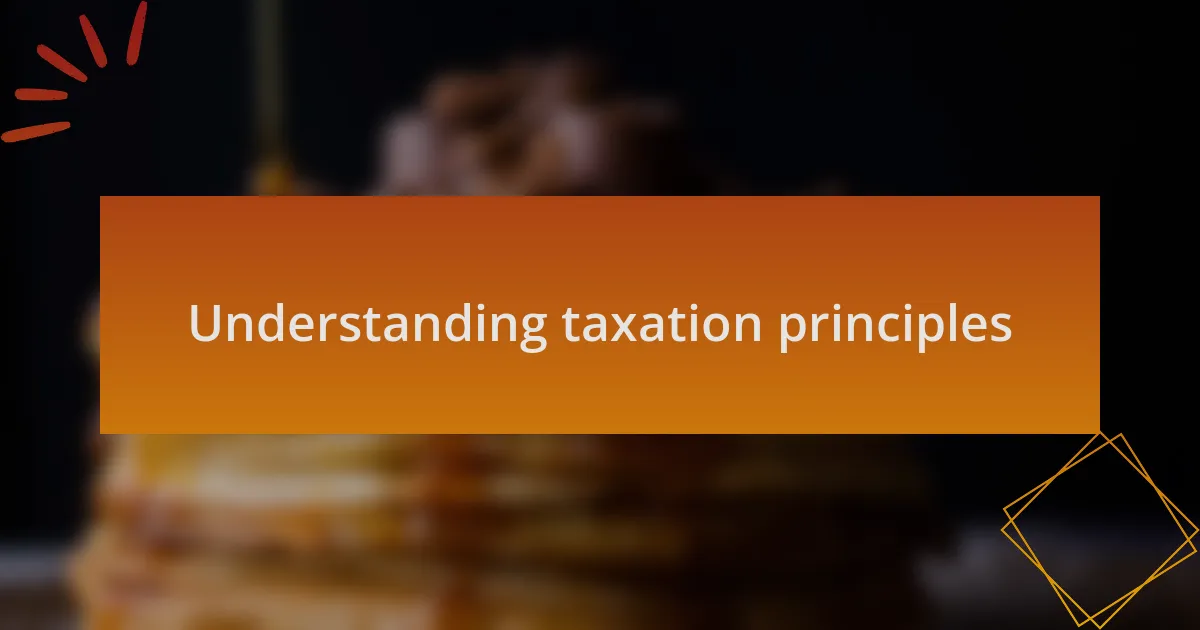
Understanding taxation principles
Taxation principles can feel overwhelming, especially when it comes to niche markets like cannabis edibles. I remember my first encounter with tax regulations in the cannabis industry—it was like trying to decipher a foreign language. The complexities are real, and understanding how these taxes are structured is essential for anyone looking to navigate this landscape.
At its core, taxation for cannabis revolves around excise taxes, sales taxes, and sometimes even local taxes. These levies can drastically influence pricing and profitability, and it’s crucial to recognize how they apply to your products. Have you ever wondered how these taxes impact the final price of your favorite edibles? The answer lies in the layers of taxation that businesses must navigate.
Moreover, many states have specific taxation rules that apply to cannabis, which means even seasoned entrepreneurs can find themselves at a loss. During my journey, I’ve learned that keeping abreast of local regulations and changes in tax law is not just necessary; it’s vital. Consider this: how prepared are you to adapt your business model in response to shifting tax landscapes? Understanding taxation isn’t just a detail; it’s the foundation of a sustainable operation in the cannabis edibles market.
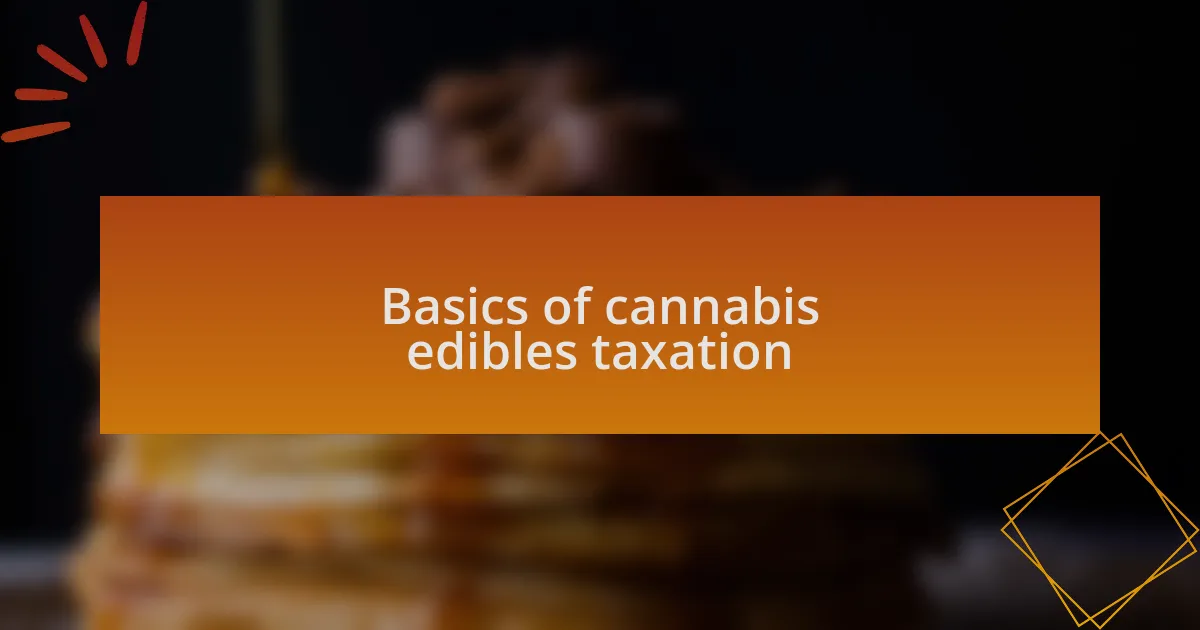
Basics of cannabis edibles taxation
Taxation on cannabis edibles isn’t just about adding percentages; it’s a maze of regulations that varies dramatically by state. I recall the first time I tried to price a product, only to discover that the taxes I had to consider changed practically overnight. It really made me rethink my entire pricing strategy because every decision felt impacted by those tax implications. Have you ever experienced a sudden change in costs that forced you to adjust on the fly? It can be challenging, but it’s necessary for staying competitive and compliant.
When delving into taxes on edibles, it’s important to understand that excise taxes—those levies placed directly on cannabis products—are often the most significant. I remember sitting with a fellow entrepreneur who was shocked to find out that excise taxes could vary based on THC content. It’s like the stronger the product, the more taxed it is! This revelation underscored for me the importance of being meticulous in product labeling and formulation if we wanted to avoid unexpected financial setbacks.
Navigating the local tax regulations can feel like being in a never-ending game of whack-a-mole. Each city and county might impose its own rules, meaning what works in one area could lead to unwelcome surprises in another. I learned this the hard way when a new ordinance caught me off guard, forcing me to scramble for answers. It begs the question: how well do you know your local tax landscape? Staying informed is not merely a good practice; it’s essential for anyone in the cannabis edibles field to thrive.
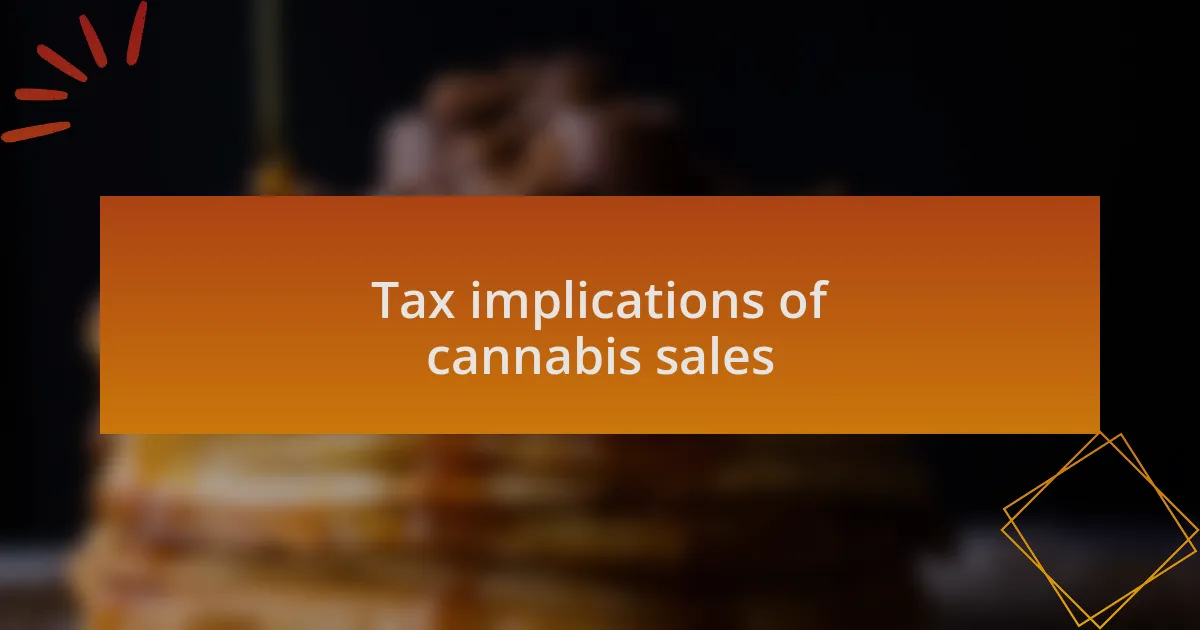
Tax implications of cannabis sales
When I first got involved in cannabis sales, one of the most surprising aspects was how the tax structure can fluctuate so widely. I vividly remember budgeting for a product launch, only to find state tax rules had shifted, leading to an unexpected dent in my profits. Have you ever had to recalibrate your financial plans because of sudden tax hikes? It can really throw you off balance if you’re not prepared.
Another layer to consider is the sales tax, which can vary not just by state but also by municipality. In my experience, I had one product taxed differently in one county compared to a neighboring one, purely based on local ordinances. This inconsistency forced me to double-check every single transaction, making the process more cumbersome. How often do you consider local tax rates when pricing your products?
Moreover, the cash-based nature of many cannabis businesses complicates tax reporting. I recall feeling a mix of anxiety and determination during tax season, knowing I had to track every sale meticulously. It’s a stark contrast to more traditional businesses, where electronic payments offer a clear trail. Have you felt the weight of managing cash flow and taxes simultaneously? It’s essential to implement robust accounting practices to stay on top of this.
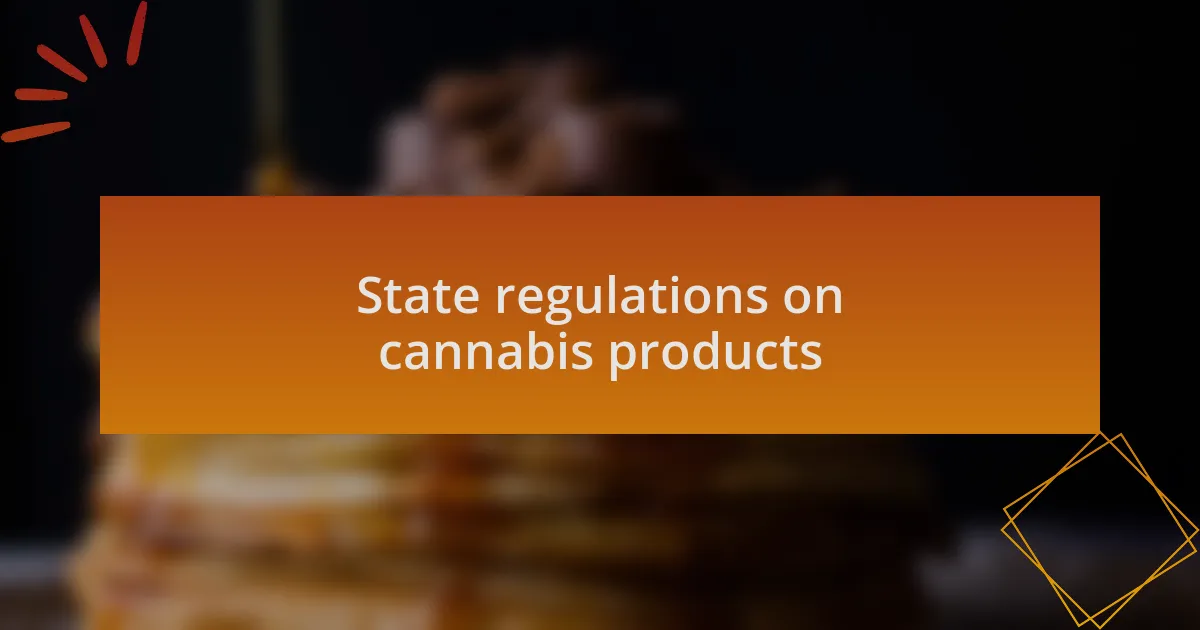
State regulations on cannabis products
Navigating state regulations on cannabis products has been a journey full of surprises for me. Each state has its own unique set of rules that dictate everything from product formulation to packaging requirements. I remember launching a new edible and discovering that the labeling laws in one state were far more stringent than what I encountered elsewhere, leading to a last-minute redesign that nearly derailed our timeline. Have you ever faced a predicament that required you to pivot quickly due to unexpected regulations?
The disparity among states can be particularly frustrating when you’re trying to scale your business. For instance, while one state allows for a wide range of cannabinoids in edibles, another imposes limits that significantly affect product innovation. I witnessed firsthand how one of my favorite recipes had to be modified to comply with state restrictions, which felt like sacrificing creativity for compliance. Isn’t it disheartening to have to choose between delivering what your customers love and adhering to state mandates?
Additionally, I’ve often found that local jurisdictions may have their own rules on top of state regulations, creating a web of complexities that is hard to untangle. I once attended a meeting where local officials outlined their unique criteria for cannabis products, leaving many entrepreneurs, including myself, scratching our heads. This experience emphasized the importance of staying informed about not just state laws but also local regulations to avoid costly missteps. How do you keep track of all these varying laws when running your business?
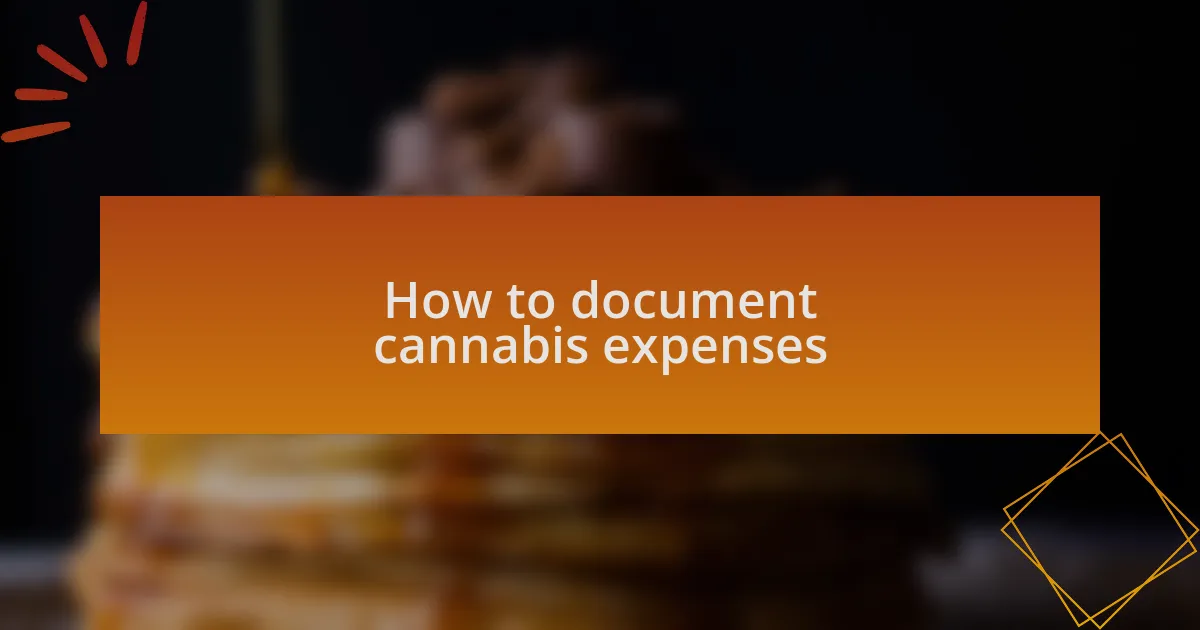
How to document cannabis expenses
Documenting cannabis expenses requires a keen eye for detail and organization. I remember the first time I attempted to categorize my costs; the sheer volume of receipts, invoices, and bank statements felt overwhelming. I found that setting up a dedicated filing system made all the difference, as it allowed me to easily track every dollar spent on materials, labor, and compliance. Have you ever scrambled to find a receipt at tax time? It can be a headache.
Using accounting software has been another game-changer for me. I started inputting my cannabis-related expenses consistently, and the ease of generating reports was eye-opening. Tools like QuickBooks or FreshBooks not only simplify the process but also help in maintaining clear records that align with tax regulations. Do you use any particular software to manage your expenses, or do you prefer the traditional paper trail?
Don’t forget to keep detailed records of any cannabis-related transactions. I’ve learned that even seemingly small costs—like packaging or marketing—can add up and have significant implications during tax season. One year, neglecting to document an important expense resulted in missed deductions that I sorely regretted. It makes you think, doesn’t it? How often do we overlook the little things that can make a big impact on our finances?
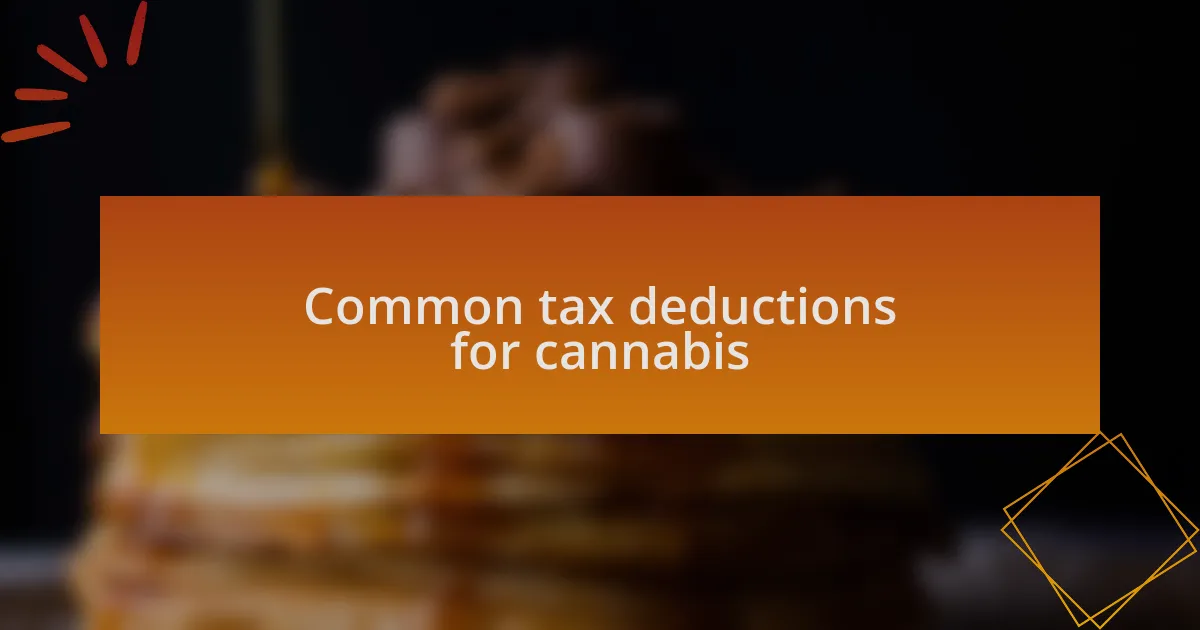
Common tax deductions for cannabis
When diving into tax deductions related to cannabis, it’s crucial to recognize that many startup costs can be deducted. For instance, expenses such as rent for your cannabis kitchen, utilities, and equipment purchases are all up for grabs. I remember the first time I filed my taxes and saw the savings from deducting my kitchen space—what a relief that was! Have you taken into account all the necessary expenses associated with your operation?
Another common deduction that often goes unnoticed is the cost of raw materials. Whether it’s flour, sugar, or the cannabis itself, the expenses tied to these ingredients add up quickly. I learned this lesson the hard way after overlooking some significant costs last year. Searching for receipts might seem tedious, but every item counts. How thorough are you in capturing all aspects of your ingredient costs?
Additionally, don’t forget about professional services. Accountants and consultants who specialize in cannabis can help you navigate complex regulations, and their fees are deductible. I’ve found it invaluable to seek advice from someone with expertise in the industry—it saves you time and often uncovers further deductions. Have you considered how these services might ease your tax burden while enhancing your business efficiency?